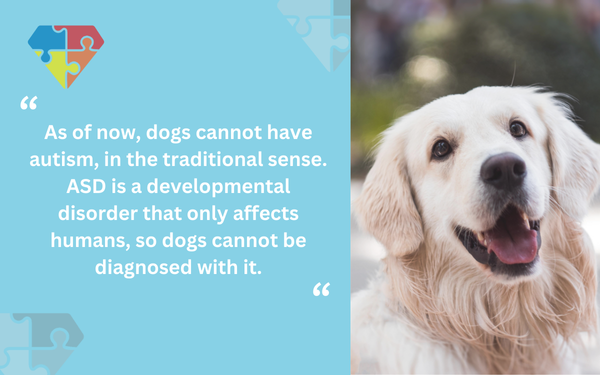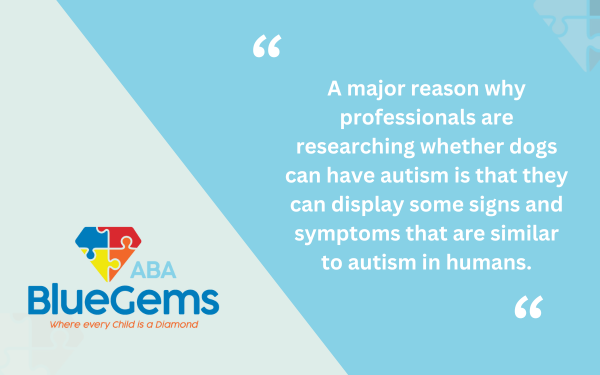Can Dogs Have Autism?
Research into autism spectrum disorder (ASD) has accelerated in recent years. Much more is known about autism today than was even 11 years ago, when the term ASD began to be used to describe a variety of developmental disorders that have similar signs, symptoms and characteristics.
Since ASD is so complex, there is a lot that continues to be discovered about it every day. And as more information about it is revealed, more questions arise as to not only what defines autism but whether it can be present outside of humans as well.
It’s no secret that dogs can exhibit similar behaviors to that of humans, from joy and happiness, to sadness, fear and even anxiety. This has a lot of people questioning whether dogs can have autism.
Below, we’ll discuss in more detail the growing interest in exploring whether dogs can have autism.
Table Of Contents
What is Autism Spectrum Disorder (ASD)?
Autism spectrum disorder (ASD) is an umbrella term that’s used to describe a wide range of developmental disorders that have similar signs, symptoms and characteristics. The term was first coined in 2013, and any conditions that are now lumped under it are no longer used in the medical and professional field — such as Asperger’s syndrome.
While ASD can affect children in a variety of ways and with different severity, it is generally characterized by developmental delays and challenges with repetitive behaviors, communication and social interactions.
ASD is a life-long disorder that can’t be cured but can be successfully treated with proven plans such as applied behavioral analysis, known as ABA therapy. This science-based approach to learning helps children diagnosed with ASD build the social and communication skills they need to succeed in life.
Can Dogs Have Autism?
As of now, dogs cannot have autism, in the traditional sense. ASD is a developmental disorder that only affects humans, so dogs cannot be diagnosed with it.

That being said, there is still much research ongoing into the topic, as it’s still a relatively new area of study. In other words, it’s possible that at some point in the future, things could change based on emerging research that suggests dogs can have autism.
Can Dogs Display Similar Signs to Autism?
A major reason why professionals are researching whether dogs can have autism is that they can display some signs and symptoms that are similar to autism in humans. Many veterinarians, in fact, will use autism as a comparison to describe to dog owners what their pet might be experiencing.

There is a similar condition to autism in dogs that’s called CDB, or canine dysfunctional behavior. A cause of CDB hasn’t been determined yet, but it’s widely believed to be related to a dog lacking mirror neurons.
Dogs who are diagnosed with CDB will face challenges learning certain social skills, especially from other dogs. While it’s a very rare condition, certain breeds are more susceptible to it.
Like autism, dogs who have CDB are born with the disorder, and it’s noticeable during the early parts of their life.
What are Some of the Signs of CDB in Dogs?
The common signs of CDB in dogs will look similar to the common signs of autism, which is another reason why the two developmental disorders are often linked.
These include …
Engaging in behaviors that are repetitive, including consistently chasing its tail for a long time
- Showing obsessive behaviors, including constantly chewing
- Not responding to typical interactions from other dogs and humans
- Not expressing typical moods or feelings
- Seeming to be stuck in a “trance-like” state
- Not reacting appropriate to particular stimuli
- Not participating in physical activity or participating in less physical activity over time
- Avoiding any new situation
- Reacting in an odd way to excessive stimulation
As you can see, some of these common signs of CDB in dogs are similar to the common signs of ASD in children. The repetitive and obsessive behaviors; the challenges with communication, social interaction and taking interest in tasks; and the general anxious-like responses to new situations are all things that children who are on the autism spectrum may exhibit.
Blue Gems ABA Evaluates and Treats Children on the Autism Spectrum
As of now, dogs cannot be officially diagnosed with autism, even though there is a developmental disorder in dogs that looks similar to ASD in many ways. If your dog is displaying some of the signs mentioned above, it’s important to talk with your veterinarian about your concerns.
At Blue Gems ABA, we specialize in diagnosing and treating children on the autism spectrum. We have a team of trained and licensed clinical psychologists who specialize in evaluating children for ASD.
If your child is diagnosed with autism, we also have a team of licensed and experienced BCBAs who create personalized ABA therapy treatment plans to help them build the social and communication skills they need to succeed in life.
Our ABA Therapy location in Baltimore MD, or across all the states we serve, specialize in the diagnosis and treatment of autism in children.
For more information, please contact us today.




